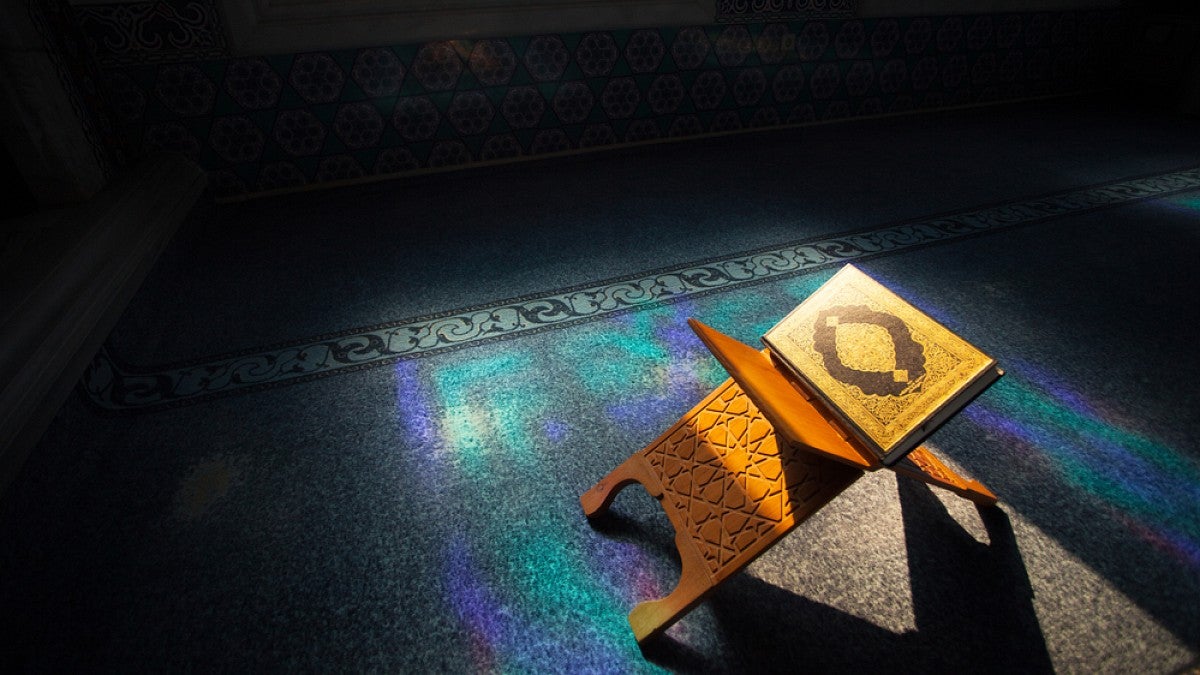Faculty members in the UO’s Department of Religious Studies have received prestigious national awards to pursue research projects examining issues ranging from the religious influence of the Dead Sea Scrolls to the origins of Islamic scripture.
The four faculty members have received more than $339,000 toward their respective research projects over the next academic year and beyond.
“These grants and fellowships will afford critical time for these faculty members to generate numerous contributions to knowledge across the discipline,” said department head David Hollenberg, a professor of Arabic and Islamic studies. “Collectively, they showcase the important and diverse research of the religious studies faculty.”
The individual projects are outlined below.
Politics and Natural Resources in Early China
Luke Habberstad believes some of the earliest debates about the government’s role in environmental engineering occurred during the Han Dynasty in early Imperial China when the government used technology like dams and dikes to control water. His research examines the heated debate it ignited over the unpredictable consequences of environmental manipulation and sustainability, as devastating floods killed thousands and displaced hundreds of thousands of people across the empire.
His research argues that this debate reframed how people thought about the role of the state and human beings in manipulating the environment and natural resources.
Habberstad, a professor of early Chinese literature and religion, received a postdoctorate fellowship for the book-length project “Water Control and Political Culture in Early Imperial China” from the Henry Luce Foundation and American Council of Learned Societies Program in China Studies.
The Dead Sea Scrolls and New Religion
Anne Kreps is digging into a new angle of the Dead Sea Scrolls, a collection of ancient manuscripts that were discovered in the Judean Desert and contain biblical material, much of which wasn’t incorporated into the Hebrew Bible and other religious texts when they were written 2,000 years ago.
Kreps, a professor of early Judaism and Christianity, is researching how the Dead Sea Scrolls have intersected with the formation of a handful of new religious movements. The Dead Sea Scrolls have earned a great deal of interest from both the public and scholars and Kreps’ project will offer new insights into how people have interpreted these texts since their discovery in 1947.
She received a fellowship through the American Council of Learned Societies and an Andrew W. Mellon Summer Faculty Research Award through the UO’s Center for Environmental Futures for her project “The Dead Sea Scrolls in the American Religious Imagination.”
Origins of Islamic Scripture
Stephen Shoemaker is investigating the Qu’ran’s emergence as the central religious text of Islam, a subject that is surprisingly understudied, he explains, as much of its history has been adopted from the Islamic understanding of its origins. He will probe into the history that predated the Qu’ran, examine how it was adopted as scripture, and see how it relates to ideas that are central to Christian and Jewish communities.
Shoemaker, a professor of the history of Christianity, received fellowships through both the National Endowment for the Humanities and the Institute for Research in the Humanities at the University of Wisconsin-Madison for his project “Qur’an and Canon: The Contours of Scripture at the End of Antiquity.”
Recovering a lost Arabic Source from Shi’i Islam
Hollenberg is producing a critical edition and translation of an important text from an understudied branch of early Shiism known as Nusayrism. Nusayrism first emerged in ninth-century Iraq and is now a prominent religious presence in modern-day Syria.
This project will help broaden the foundation of understanding into this group’s origins, doctrines and history as it provides access to a key early source to scholars and a broader audience. Hollenberg, a professor of Arabic and Islamic studies, explains that it has become increasingly clear through his research that the text offers an important lens into a group that has received little reliable scholarship, despite its long history and contemporary geopolitical importance.
“The Method of Knowledge,” which covers the mains tenets of Nusayrism, was composed in 1050 and survives through two manuscripts that were copied in the 19th century, one now at the Van Pelt Library at the University of Pennsylvania. Hollenberg first encountered the source while cataloging Penn’s Arabic manuscripts while in graduate school there.
Hollenberg and co-director Mushegh Asatryan, a professor from the University of Calgary, were awarded a Scholarly Editions and Translations grant from the National Endowment for the Humanities for their project “Recovering Early Nusayri Shiism: A Critical Edition and Translation of the Manhaj al-‘ilm (The Method of Knowledge).”
—By Emily Halnon, University Communications


